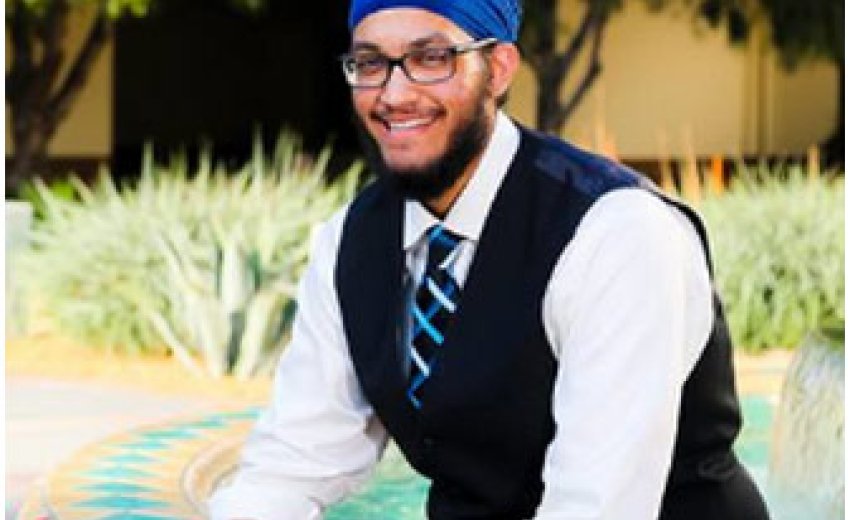An interview with Manjot Singh – A student leader at UCLA
 1984,
just the year itself conveys deep emotions still felt by Sikhs, all
over the world. This was the time when our sacred precincts were
attacked and desecrated by the Indian Government.
1984,
just the year itself conveys deep emotions still felt by Sikhs, all
over the world. This was the time when our sacred precincts were
attacked and desecrated by the Indian Government.
The generation that lived through this trauma and the generations that have come thereafter are not lost to each other. Young Sikh boys and girls studying at universities here in the west continue to keep the torch of remembrance burning. More so they are also taking concrete steps, which will be critical in how history is written and remembered.
Manjot
Singh, General Representative 1 on the Undergraduate Students
Association Council took the initiative to get the USAC to pass the
resolution that “ the USAC solemnly commemorates the 1984 Sikh
Genocide”. Along with this the council also passed the resolution
to “establish November as Sikh Awareness Month and the official
month of remembrance for the Sikh Genocide” and “that the USAC
supports the efforts of members of the Sikh Student Association to
push for a Sikh Studies course to be established on UCLA’s
campus”.
Manjot served as the President of the Sikh Students
Association of UCLA, last year.
We caught up with Manjot via email and posed a set of questions to him to better understand his motivations, aspirations and achievements. Despite been a busy with all that happens during graduation time, he took out the time to share with us his thoughts. We wish him the best as he continues his activism & further education.
Sikh Foundation (SF): Tell us a little bit about your personal (family/education) background?
Manjot Singh (MS): I come from a family, like many others, that has always emphasized education as a tool for liberation, that education is the one thing that no one can take away from you, no matter your circumstances. Although there are incredible institutional barriers preventing communities of color from accessing higher education, this truth still remains. I had the beautiful opportunity of growing up with my grandparents around, whose Sikh values were ingrained in my sister and I at an early age. My parents carried on this legacy, which has pushed my sister and I toward careers of service. I had the privilege of attending the University of California, Los Angeles, and am proud to say I will be graduating in a couple of weeks. My sister attends UC Berkeley law school and is entering into her second year there.
SF: Give us a background on the UCLA- Sikh Students Association & the USAC?
MS: The UCLA Sikh Student Association has always been a breeding ground for discussing Sikh theology and questions about how our faith would respond to various modern day issues. Additionally, it provided a community to rely on and was my first introduction to the essence of this university. If it were not for the community that I built with the SSA when I first arrived as a freshman, I am positive my UCLA experience would not have been as fulfilling or life changing as I can retrospectively say it is today. The relationship I built with the Sikh Student Association community allowed me to be comfortable with my identity, be confident in my appearance, and served as a launching pad to other leadership roles that I took on later in my UCLA career.
I ran for student government (Undergraduate Students Association Council) during the Spring quarter of my junior year as the first ever Sikh student with a turban. It is this confidence that SSA inspired within me and the community backing that made me comfortable to stand in front of the UCLA student body with a bright blue turban and be able to shine more light on a community often mischaracterized or treated as invisible. After winning in the election, I served as the USAC General Representative 1 for the 2014-2015 school year.

SF: What motivated you to take up the issue of the Sikh Genocide?
MS: Coming from a community that I perceive to be fairly apathetic to the political environment that we are surrounded by, I thought taking up this issue would be a strong step toward politicizing the Sikh community both at UCLA but also other universities we bring this resolution to. I have always found our community rather reactionary. Whenever something bad happens to our community, whether it is a hate crime or misidentification in the media, we always try to implement some sort of damage control strategy. Although there are efforts by various Sikh civil rights organizations to actively educate American society on who Sikhs are, it is always a rather homogenous narrative that is told, excluding the immense diversity that comprises our community. It takes active education on the ground that will really make a difference in breaking down the stigma associated with our external identity. We must stray away from this top-down approach to educating our society on our faith.
SF: What has been result of this resolution and what further do you hope to achieve with the passing of this resolution?
MS: I realized that passing this Sikh genocide resolution on university campuses would be the best place to start. Colleges are intellectual playgrounds where ignorance is either fueled or destroyed. Bringing such issues as the grave human rights violations perpetrated against my community only thirty years ago to the forefront allows students to learn about something they would have probably never encountered in the “real world.” It is the support of both the Sikh community at UCLA as well as other communities that stand in solidarity with our own that has really allowed this issue to come to the forefront. It has become a movement. With this resolution, we hope to spread awareness of this dark time in our history, but also push toward the recognition the Sikh community deserves. We may have recovered from the material damages of the genocide, but the memory that lives within our parents and grandparents generation is something that can never be forgotten. This trans generational trauma is what we are seeking to address in spreading this resolution and seeking recognition from as many universities and legislators as we can.
The goal is to have passed this resolution at every UC campus by the end of Fall. We will begin working on CSU schools and expanding to other universities as well.
SF: Three UC campuses have successfully established Chairs of Sikh Studies. Is that an important goal for the students and management of UCLA?
MS: I have been in conversation with Dr. Kapany of the Sikh Foundation who is currently in touch with the Dean of Humanities at UCLA, David Schaberg, to establish a Chair of Sikh Studies here. This is absolutely an important goal for our campus and was actually listed as part of the “resolved” clauses of the resolution, to provide more student support for the movement. I also created a change.org petition earlier in the school year to support efforts for Sikh studies which we presented to administration.
SF: What kind of support do you need from the community for achieving these objectives?
MS: The main kind of support we need for the objective of establishing a Chair of Sikh Studies is financial support. Another gap that should be addressed by the community is consolidating resources in one place for members of SSA’s around the nation to tap into. This could be in the form of educational materials about Sikhism, financial resources that can be used for specific purposes (religious, cultural, etc.), a list of Sikh alumni in professional fields in different regions that can help students navigate certain fields, and much more. These are all starting points for how the community can help support students and their efforts on campuses.
SF: What are the steps you would like the US Government to take in response to this Resolution?
MS: The first step that needs to be taken before anything happens on a national level is for individual states to recognize the Sikh genocide and for advocacy to be done on a state-by-state level, just at it has been done here in California. With enough momentum, we as a community should be able to push the US government to recognize these human rights violations. Making the Sikh genocide be part of educational materials in history textbooks would be another strong step in the right direction.
SF: What advice would you like to give young Sikh boys and girls who are heading to colleges?
MS: My advice to young Sikh boys and girls heading to college would be simple. Know your roots. And I don’t mean know your religion and the 5 K’s and the basic tenants. I mean really try to understand why we call Sikhi a lifestyle and why it is so much more than just a list of values we try to adhere to. Additionally, understand your parents’ stories and how and why you are where you are. If it were not for our immigration stories, none of us would be in the unique position we are where college is even a prospect, a position so many of our parents never had the privilege of experiencing. Don’t just do the bare minimum when you get to college. I have met so many individuals who want to get good grades, keep their head low, and get into a good medical school and continue to pursue aspirations that are not their own. Challenge the status quo in college, join political organizations, make a lot of noise, and never let people forget that Sikhs are a force on campus. Be a part of the Sikh community on your campus but never forget to stand in solidarity with other oppressed communities. That comes from knowing the history of Sikh persecution. These stories are what will uplift us and eventually liberate us.

